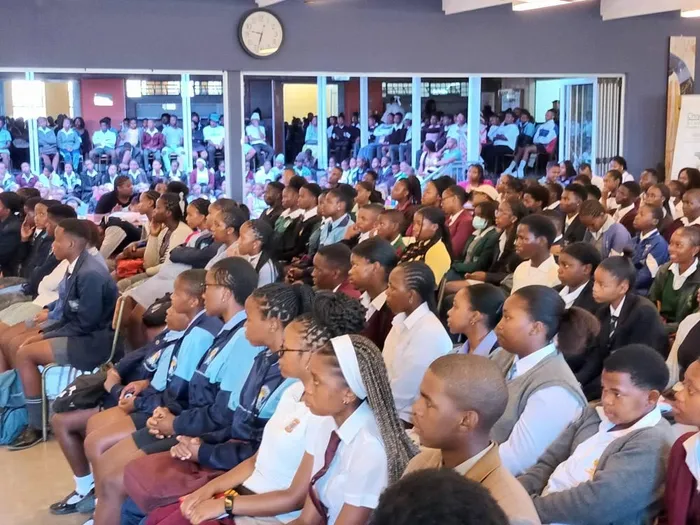How monitoring and learning can enhance socio-economic impact
Opinion

MEL findings show that social workers and psychosocial support professionals in schools help learners deal with issues such as bullying, GBV, substance abuse and teenage pregnancy.
Image: Supplied/Vukile Sonandzi
IN a rapidly changing world where social, environmental, and economic challenges intersect, organisations are under increasing pressure to not only do good but to prove it.
The ability to scale their socio-economic impact meaningfully depends on how well a company can learn from its actions, adapt to new insights, and stay accountable to its goals. At the heart of this approach lies a critical, often underleveraged, tool – monitoring, evaluation, and learning (MEL).
Since 2019, the Vodacom Foundation, which is the corporate social investment (CSI) arm of Vodacom South Africa, has integrated Monitoring, Evaluation, and Learning (MEL) into the core of our social investment efforts.
Traditionally, MEL has been a skill mainly associated with large civil society organisations and certain government bodies, rather than corporations. For Vodacom, MEL goes beyond just annual reports submitted to government entities or business sectors to a central MEL team; it focuses on implementing the theory of change and a logic framework.
This means that programmes are established with clearly defined objectives, inputs, activities, outputs, outcomes, and impact while also recognising that these results are realised over the long term.
Critically for Vodacom, adopting MEL has allowed us to move beyond traditional philanthropic models and embrace a more developmental, evidence-based and evolving approach that informs decision-making and prioritises impact and learning over optics.
One common pitfall organisations face is treating MEL as an administrative task to satisfy reporting requirements and therefore limiting its value. To truly scale impact, MEL must be integrated at every level of programme design and delivery. This means choosing the right indicators – those that measure outcomes, not only outputs.
For example, it’s not enough to track how many women attend a digital literacy workshop. There needs to be information on whether that training changed their economic participation, confidence, or access to opportunities. Impact isn’t about numbers alone; it is about broader societal change and transformation.
In addition, maintaining a MEL system requires a regular and consistent flow of data, which encourages constructive feedback to help shape present and future interventions for greater relevance and effectiveness. Our MEL approach enables us to understand the real needs of communities, giving us the insights required to scale programmes effectively.
In our view, development initiatives thrive within systems where each player understands and fulfils their unique role. For us at Vodacom, this means positioning ourselves as a digital partner, especially in our key focus pillars of education and gender empowerment.
Take a feeding scheme we support in Soweto. For example, while we initially financially contributed to the ACFS Community Education and Feeding Scheme, MEL insights highlighted an opportunity for greater impact by instilling our education pillar.
Through feedback from stakeholders, particularly those on the ground, we established computer labs staffed with ICT coordinators. This has enabled children who benefit from the feeding scheme to access computer literacy training and e-learning platforms.
Informed by continuous evaluation, we are helping young people build the skills they need to participate in the digital economy, amplifying the long-term developmental value of our support.
A successful MEL approach should ensure the voices of beneficiaries and partners are heard and acted upon. One way we do this is through our videos, where beneficiaries tell their impact stories in their own words. These powerful narratives help us understand the human impact behind the numbers to continue to transform the communities we serve.
Embedding the culture of MEL also enables reflection. Findings from periodic evaluations provide an opportunity to sit with stakeholders to measure progress, celebrate achievements, and identify challenges. These collaborative learning moments have been instrumental in refining our programmes and driving scalable solutions.
We have seen the success of this throughout our Foundation initiatives, including our psychosocial support programme, implemented in response to the growing incidents of bullying and gender-based violence (GBV) in schools.
Our MEL findings show that psychosocial support professionals in schools help learners deal with issues such as bullying, GBV, substance abuse and teenage pregnancy. Based on this data, 41 skilled psychosocial support professionals have been placed in our Schools of Excellence (SOEs) across the country, offering critical, targeted psychosocial interventions that ensure schools can be a safe, inclusive environment where learners reach their full potential.
So far, the programme has reached more than 40 000 learners. In certain schools, absenteeism has decreased, and educators have reported a positive change in learner behaviour and confidence.
Importantly, data, insights and challenges provided by MEL systems should not be locked away in reports. Communicating learnings with stakeholders, internally and externally, upholds transparency and ensures collective ownership.
Whether through data dashboards, panel discussions or storytelling in our impact videos, we seek to promote the progress of programmes and build trust through mutual accountability. This, in turn, drives support and can expand the reach of our CSI activities.
Organisations that effectively integrate MEL into their culture are more successful in amplifying the outcomes that are most important. Therefore, we call on local organisations to adopt the MEL tool as it will assist them to evolve into a pathway for gaining deeper insights, fostering improved partnerships, and enhancing accountability.
The adoption of the MEL will guarantee that CSI programs are not only effective but also inclusive, adaptable, and resilient, assisting us in achieving the goal of driving sustainable socio-economic change in local communities.
* Taki Netshitenzhe is the director of external affairs at Vodacom South Africa
** The views expressed here do not reflect those of the Sunday Independent, IOL, or Independent Media.